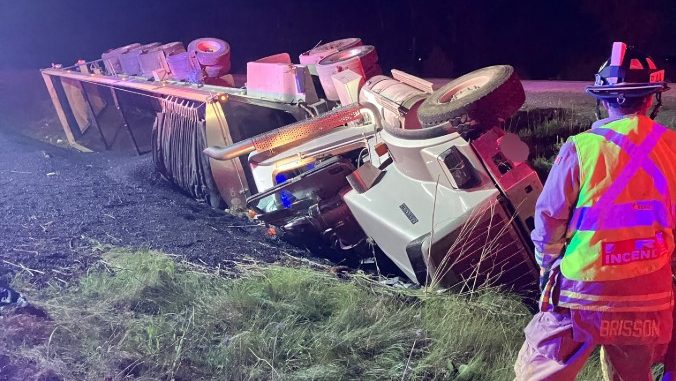Quebec to lift COVID-19 curfew Monday, extend vaccine passport to retail
Posted Jan 13, 2022 08:50:00 PM.
Quebec Premier François Legault says the number of daily COVID-19 cases in Quebec appears to have peaked, allowing him to lift the curfew on Monday that he imposed to protect hospitals from a record surge in infections.
Health experts project that COVID-19-related hospitalizations, which were at an unprecedented 2,994 on Thursday, should peak in the coming days, Legault told reporters in Montreal.
Legault introduced the 10 p.m. to 5 a.m. curfew on Dec. 31 — in time to ban people from the streets on New Year's Eve. He had imposed a curfew earlier in 2021 for almost five months, between January and May. Quebec is the only province to prohibit its citizens from leaving their homes at night as a way to control COVID-19 transmission.
“We saw at the end of December that the increase of new infections was very, very fast,” Legault said. “So, even if it wasn't popular, we decided to put in place tough measures.
“Today, we see that the increase in cases and hospitalizations is slowing down, so we removed some of the measures.”
But he also added new ones, targeting mainly the unvaccinated, whom Legault has threatened to tax with an unspecified financial penalty. The premier said legislation to put the tax into effect would be introduced in February.
Starting Jan. 24, Quebecers will need to show proof of vaccination to enter big box stores with surface areas of 1,500 square metres or more, other than pharmacies or grocery stores. Last week, Legault announced that the vaccine passport would also apply to cannabis and liquor stores starting Jan. 18.
Health Minister Christian Dubé said the rule will be based strictly on the floor size of the retailer.
“So, the best example is a Costco will have to ask for the vaccine passport; a Walmart will have to require the vaccine passport,” Dubé said.
Dr. Luc Boileau, Quebec's interim public health director, said the projections from the province's health-care research institutes — that daily cases have peaked and hospitalizations would soon follow — are “not a certainty, so we have to wait to confirm it.”
But the rate at which hospitalizations have been increasing — particularly in intensive care — appears to be slowing, he said.
Quebec reported 45 more deaths attributed to the novel coronavirus on Thursday and a rise of 117 COVID-19-related hospitalizations. The Health Department said 2,994 people were in hospital with COVID-19, including 272 people in intensive care, a rise of nine from the day before.
The announcement about the end of the curfew came the same day a Mainstreet Research poll indicated support for Legault's Coalition Avenir Québec party slipping — but the party was still ahead with 38 per cent.
Québec solidaire, a left-wing party that has criticized the curfew, and the Conservative Party of Quebec, which opposes many of the government's health orders, both made gains, with 19 per cent and 13 per cent support, respectively.
Legault, however, said the poll was released after he made the decision to lift the curfew, adding that his health orders aren't political.
“I'm not here to win a popularity contest,” he said. “I'm here to try to protect Quebecers and to put in place the best measures taking into consideration science and what public health is telling us.”
Indoor private gatherings across the province are still banned, and restaurant dining rooms, gyms, spas and entertainment venues remain closed.
François Vincent, the Quebec vice-president of the Canadian Federation of Independent Business, said his organization had told the government that applying the vaccine passport in small stores would be onerous for business owners. And while the passport will only be required in big stores, it still brings additional costs — phones are needed to verify the passports and some businesses may need to hire more staff or security guards to enforce the order.
“It will be a burden for all the businesses who have to apply it,” Vincent said, adding that workers or store owners may have to deal with angry customers.
Quebec is also moving forward with a plan for schools to reopen for in-person learning on Monday. The premier has said junior colleges and universities could also reopen but they will be given the flexibility to adjust to in-person classes.
Boileau said he doesn't believe schools will lead to increased transmission of the virus in the community. Reopening schools can be done safely, he said, because children — who will be required to wear masks in class — are less likely to become seriously ill from COVID-19 than adults.
Health officials reported 8,793 new cases of COVID-19 on Thursday and said about 16 per cent of tests taken came back positive. On Jan. 7 by contrast, daily cases were at roughly 16,000 and the test-positivity rate was 25 per cent.
Jacob Serebrin, The Canadian Press








